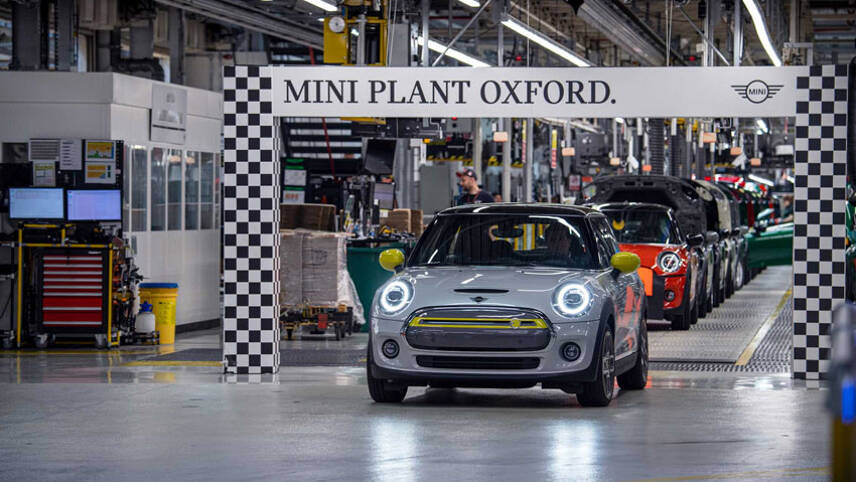Register for free and continue reading
Join our growing army of changemakers and get unlimited access to our premium content

Image: BMW
This is a new warning today (9 June) from the Energy and Climate Intelligence Unit (ECIU).
At present, the vast majority of cars manufactured in the UK are exported – around 80%. Most of these vehicles go to one of three markets – the EU, China and the US.
As these markets and others expand their own EV manufacturing capacity and seek to meet long-term climate goals, they are likely to import fewer vehicles from Britain unless it positions itself as an EV manufacturing leader, the Unit is warning.
It estimates that, in 2030, the UK could export cars worth £10.9bn less to the EU than it did last year. It also stands to miss out on £1.45bn of exports to China and more than £900m of exports to the US. In total, a decline in car export revenue of up to 59% is on the cards.
Carmakers have, in recent years, accused the UK Government of failing to implement legislation and regulation that would make EV manufacturing in Britain a more attractive proposition than it is elsewhere. Calls to action have been particularly strong this winter amid the energy price crisis and the fallout of Brexit.
Ford, Jaguar Land Rover and Stellantis last month told Ministers that their investments in UK-made EVs and components are hanging in the balance. They called for changes to post-Brexit tariffs on goods traded with the EU. They also raised concerns over energy prices and the continued challenges to the development of battery gigafactories in the UK, including BritishVolt entering administration earlier this year.
It has been reported that Jaguar Land Rover will pick the UK over Spain for its own battery plant but this is yet to be finalised. National tabloids have suggested that the decision may rest on a one-off Government payment.
The ECIU is warning of further faltering within the industry unless the UK responds to the US’s Inflation Reduction Act and the EU’s Green Deal Industrial Plan. Both of these packages allocate billions of subsidies to the energy transition, including EVs.
The UK has promised its own response later this year, in the Autumn Statement.
ECIU transport analyst Colin Walker said: “The UK is yet to stump up the level of cash incentives, tax cuts or regulatory reform to retain and attract businesses rushing to take advantage of the incentives on offer in the US and EU.”
editor’s note: Shortly after the ECIU published its analysis, the US and UK agreed on new measures that could potentially enable British firms to access financial support under the former’s Inflation Reduction Act. The so-called ‘Atlantic Declaration’ is set to be open to carmakers.
ZEV mandate
The ECIU is calling on the Government to provide certainty to automakers and would-be battery investors before the Autumn Statement. A step that Ministers could take, it is arguing, is finalising the UK’s Zero Emission Vehicle Mandate (ZEV mandate).
This piece of legislation will set minimum requirements for the proportion of a carmaker’s sales that must be electric. Percentage requirements increase over time, to 100% in 2030 – the UK’s end date for the sale of new petrol and diesel cars and vans.
A consultation on appropriate ZEV mandate targets was held by the Department for Transport earlier this year and the outcome is expected this summer.
At present, the Government is proposing a 22% ZEV mandate for carmakers for 2024. Firms producing more than 22% of their vehicles to zero-emission standards will receive credits which they can sell to competitors who fail to meet the minimum requirement.
New AutoMotive this week revealed that the 32 manufacturers covered by the mandate would have missed its requirements by more than 48,000 vehicles, if it had been in place over the past 12 months.
New AutoMotive’s research and policy officer Ciara Cook said: “The Government needs to ensure that the multiple flexibilities in the scheme does not mean that manufacturers can simply continue with business as usual and not properly funnel their supply chain away from diesels, and towards electric.
“Once a market-pushing ZEV Mandate has been implemented by the government the manufacturers will have to start ramping up their production. However, they should not use this time to rest on their laurels, but use this time to start shoring up their production capabilities and supply chain.”


Please login or Register to leave a comment.